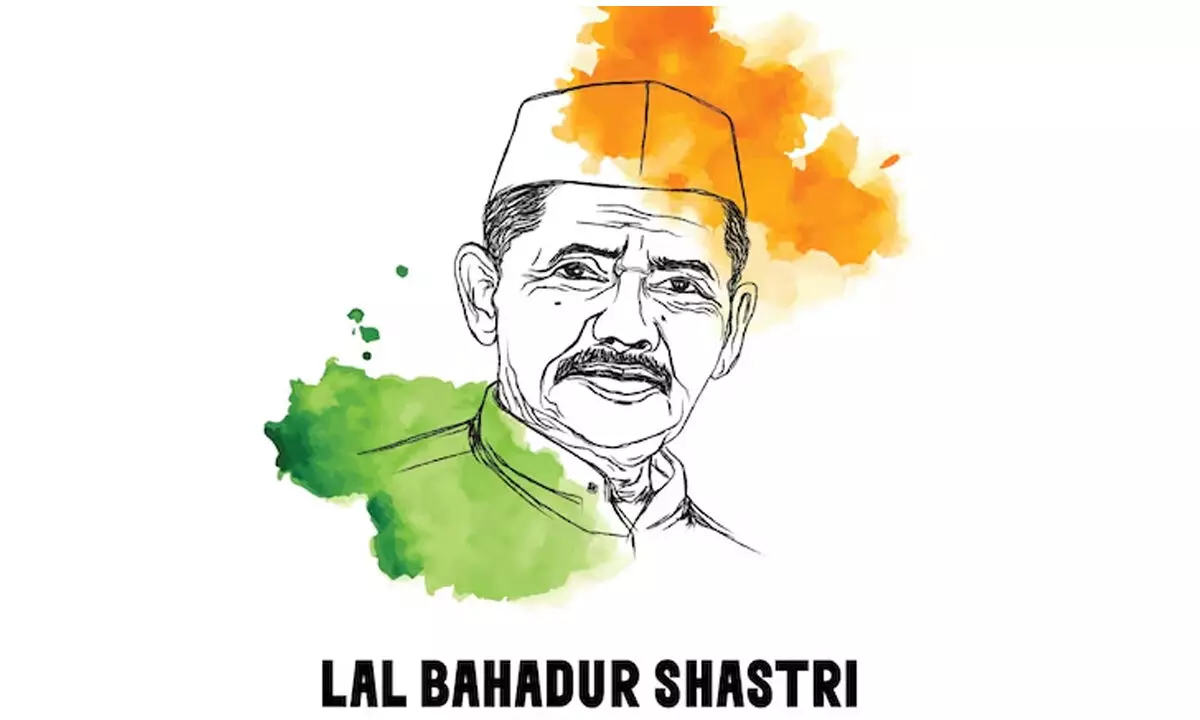Live
- Police book case against KTR for unauthorised rally
- Literature crucial in nurturing creativity
- Academicians debate on trends observed in 2024 General Elections
- Adah Sharma to perform Shiv Tandav stotram at the MahaKumbh mela
- Haryana Guv urges TG, AP CMs to implement NEP-2020
- Tail-end farmers should get irrigation water, says Uttam
- SpinSci to churn out 1K AI-based jobs in Telangana
- Kothapalli-Manoharabad rly line to be operationalised by 2027
- Industrial production at 6-mth high in Nov
- Traffic restrictions on heavy vehicles in Rachakonda
Just In
Lal Bahadur Shastri Jayanti 2024: 10 Inspirational Quotes from India’s Second Prime Minister


Lal Bahadur Shastri, India’s second Prime Minister, was a symbol of honesty, integrity, and humility.
Lal Bahadur Shastri, India’s second Prime Minister, was a symbol of honesty, integrity, and humility. His legacy continues to inspire generations. Born in Mughalsarai, Uttar Pradesh, he shared his birthday with Mahatma Gandhi and was greatly influenced by the Mahatma’s ideals of non-violence and self-sufficiency.
Shastri’s famous slogan, Jai Jawan, Jai Kisan, became a symbol of national unity during the 1965 war with Pakistan, emphasizing the importance of both the soldiers and the farmers. He served as India’s Prime Minister from 1964 until his untimely death in 1966.
A Life of Simplicity and Selflessness
Shastri led a life defined by simplicity. During a national food crisis, he asked Indians to voluntarily skip a meal a day to demonstrate solidarity with the nation. This request came after the United States threatened to cut off wheat supplies during the India-Pakistan war. His call for sacrifice reflected his selflessness and minimalistic lifestyle.
Shastri passed away in Tashkent on January 11, 1966, but his values and vision for India remain relevant today. On his birth anniversary, let us reflect on some interesting facts about his life and draw inspiration from his words.
Interesting Facts About Lal Bahadur Shastri
• A Stand Against the Caste System: Born Lal Bahadur Shrivastava, Shastri dropped his surname to reject the caste system, symbolizing his commitment to equality.
• Affectionately Called ‘Nanhe’: In his childhood, he was fondly called Nanhe, meaning “the little one,” by his family.
• Walking Barefoot to School: Shastri could not afford slippers as a child and would walk barefoot to school, even during the scorching summer heat.
• Joining the Freedom Struggle at 16: At just 16 years old, he joined the freedom movement, answering Mahatma Gandhi’s call for the Non-Cooperation Movement.
• A Simple Wedding: In 1927, Shastri married Lalita Devi from Mirzapur. The wedding followed traditional customs, but instead of an elaborate dowry, he accepted a spinning wheel and a few yards of handspun cloth.
• Earning the Title ‘Shastri’: The title Shastri was conferred upon him after he graduated from Kashi Vidyapeeth, where he studied philosophy and ethics.
• A Humble Loan for a Car: Shastri once took a loan of Rs 5,000 to purchase a Fiat car. After his death, his wife repaid the loan using the family’s pension.
• Appointing Women as Bus Conductors: As Minister of Police and Transport in 1947, he made a groundbreaking decision to appoint women as bus conductors, a rare move at the time.
• Years Spent in Jail for the Nation: Shastri spent approximately seven years in jail during India’s fight for independence, playing a significant role in various campaigns against British rule.
• Bharat Ratna Recipient: In 1966, Shastri was posthumously awarded the Bharat Ratna, India’s highest civilian honour, making him the first person to receive this award after death.
10 Inspirational Quotes by Lal Bahadur Shastri
1. On Colonialism: “We would consider it our moral duty to lend all support to ending colonialism and imperialism so that people everywhere are free to mould their own destiny.”
2. On Unity in Diversity: “The unique thing about our country is that we have Hindus, Muslims, Christians, Sikhs, Parsis, and people of all other religions. We have temples, mosques, gurdwaras, and churches. But we do not bring all this into politics. This is the difference between India and Pakistan.”
3. On Building a Socialist Democracy: “Our way is straight and clear – building a socialist democracy at home, with freedom and prosperity for all, and maintaining world peace and friendship with all nations.”
4. On Peaceful Development: “We believe in peace and peaceful development, not only for ourselves but for people all over the world.”
5. On National Strength: “We can win respect in the world only if we are strong internally and can eliminate poverty and unemployment from our country.”
6. On Democracy: “True democracy, or the swaraj of the masses, can never come through untruthful or violent means.”
7. On National Defense: “The preservation of freedom is not the task of soldiers alone. The whole nation must be strong.”
8. On Discipline and Unity: “Discipline and united action are the real sources of strength for the nation.”
9. On Agriculture: “In our national life, agriculture holds a very important place. It is the backbone of our economy.”
10. On Loyalty: “Loyalty to the country comes ahead of all other loyalties. And this is an absolute loyalty since it cannot be measured by what one receives.”
Lal Bahadur Shastri’s words continue to resonate with timeless wisdom and patriotism, reminding us of the values that should guide both individuals and the nation. His humility, determination, and vision for a united, self-reliant India remain a source of inspiration for all.

© 2025 Hyderabad Media House Limited/The Hans India. All rights reserved. Powered by hocalwire.com






